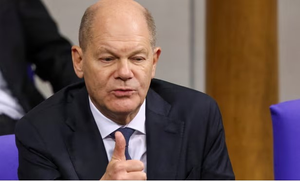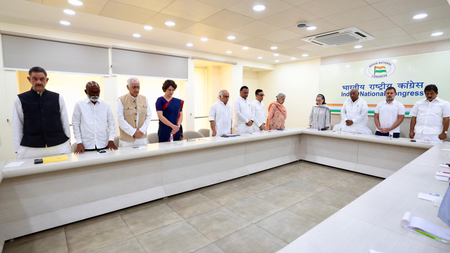
Berlin, Dec 17 (IANS) German Chancellor Olaf Scholz lost a parliamentary vote of confidence on Monday, triggering early elections set for February 23.
The embattled Chancellor, whose three-party coalition collapsed in November this year, decided that calling the vote was his best shot at reviving his party’s flagging political fortunes.
Scholz, now leading a minority government, said the snap elections would give voters the power to “determine the political course of our country,” calling the upcoming polls a critical moment for Germany’s future.
The German Chancellor had called the vote in order to deliberately lose it, urging the Bundestag, or lower house of Parliament, to declare its lack of confidence in him so that the first formal step could be made towards triggering new elections.
Scholz will now ask the President, Frank-Walter Steinmeier, to dissolve Parliament, and to formally call new elections which have to take place within 60 days and have been pencilled in for February 23.
The embattled chancellor required 367 votes of no confidence on Monday to succeed in his aim, and in the end 394 MPs obliged him. There were 207 yes votes, and 116 abstentions.
Despite the defeat, Scholz welcomed the outcome, with Bild tabloid dubbing his strategy a “kamikaze” move to dissolve Parliament and prompt elections. The rarely used mechanism has been employed by German Chancellors five times since World War II to break political stalemates.
“My goal is to bring the federal election forward,” Scholz had told a packed chamber in a forceful speech.
“This is about having trust in our country and not putting our future at risk.”
Scholz said his aim was to shore up confidence in the future of the country, insisting: “Germany’s best days lie ahead of us.”
Scholz’s three-way “traffic light” coalition collapsed in November after the pro-business Free Democrats (FDP) quit in protest over the Chancellor’s sacking of the Finance Minister, Christian Lindner, over deep disagreements around debt management.
The move left Germany with a minority government of Scholz’s Social Democrats (SDP) and Greens at a time of deep economic crisis and geopolitical uncertainty.
Scholz is to remain in place as head of the government until a new administration is formed.
He used his half-hour address in Parliament to defend his decision to push for early elections, arguing that disunity in the government could be tolerated no longer.
“Politics is not a game,” he said, harshly critical of the FDP’s behaviour amid accusations it had plotted the government’s collapse.
“I deeply regret this damage,” Scholz said.
Friedrich Merz, the head of the opposition conservative Christian Democratic Union (CDU) who is poised to succeed Scholz as Chancellor, spoke fervently about the election being a chance to vote against the government and “a day of relief”.
Germany, he said, faced a tough period if it wanted to overcome its extensive economic challenges. Germans would need to work harder, he said, as he promised fiscal rewards for those who decided to put off retirement to participate in what he called a necessary “massive national exertion drive”.
The election campaign unofficially kicked off ahead of the vote. Politicians of all parties have been battling to lure voters who are disgruntled over the cost of living crisis and stagnation over Ukraine.
In recent days there has also been a debate over whether Syrians who came to Germany as refugees to escape the war should now be urged to return since the fall of the Assad regime. There have been calls from the conservative opposition as well as the far-right Alternative for Germany (AfD) for a radical rethink on asylum policy towards Syrians.
Alice Weidel, head of the AfD, used the occasion to attack the previous coalition for what she called its “failed migration policy”, demanding the “immediate return” of Syrian refugees and labelling them as “Islamist terrorists”.
Whilst in a caretaker role, Scholz is under pressure to obtain opposition backing for a number of measures authored by his government considered urgent for progress in Europe’s largest economy.
This is all against the backdrop of the inauguration next month of the US President-elect, Donald Trump, and all the uncertainties with which the new administration might present Germany, including hefty trade tariffs and a review of military aid to Ukraine.
Measures to tackle inflation, from moving workers into higher tax brackets to subsidising high energy prices which are currently hindering industrial growth are less likely to be dealt with in time, legislators have admitted.
Due to Germany’s history of unstable, fleeting administrations that contributed considerably to the Nazis’ coming to power almost a century ago, checks and balances are now in place to ensure new elections cannot be called without considerable care and deliberation.
Ahead of the vote, Steinmeier, whose post is largely ceremonial, said: “I hope we will follow tradition and have a stable government within a reasonable time frame.”
The CDU/CSU opposition, visibly confident amid expectations it will win the next election under its investment banker leader Merz, has said it is prepared to back only the most urgent of measures.
Reluctant to appear to be helping the remnants of the Scholz administration, the Conservatives have said they may be prepared to support proposals to increase protections of the constitutional court against the tactics of any future populist government. They have also said they would increase the lifespan of a hugely successful subsidised transport pass, the future of which had appeared uncertain due to the demise of the government.
The governing Social Democrats have also urged the Conservatives to back other policies over expectations that Germany is likely to be in for an extensive period of political limbo following the election, when horse-trading between potential new government partners is likely to drag on for weeks or months.
–IANS
khz/






